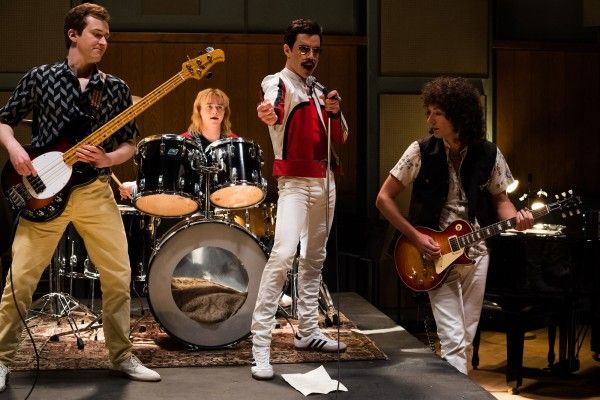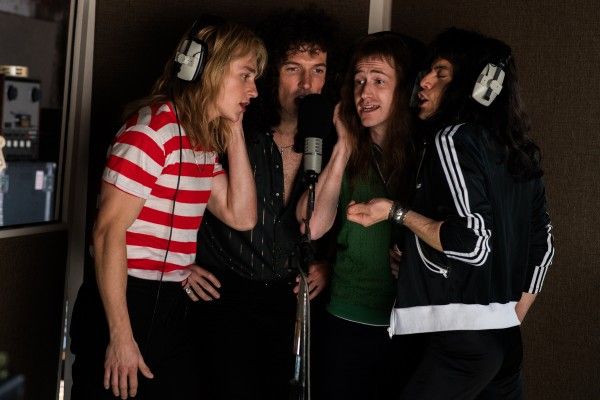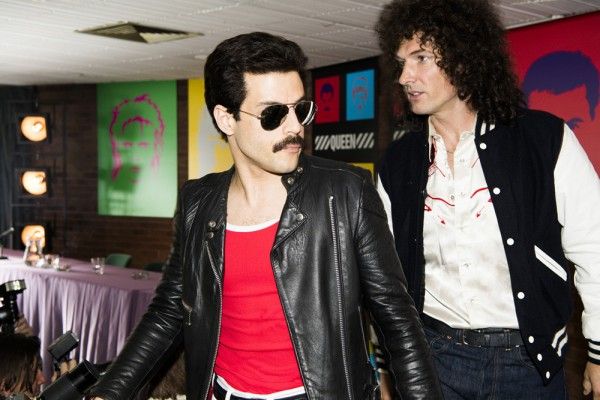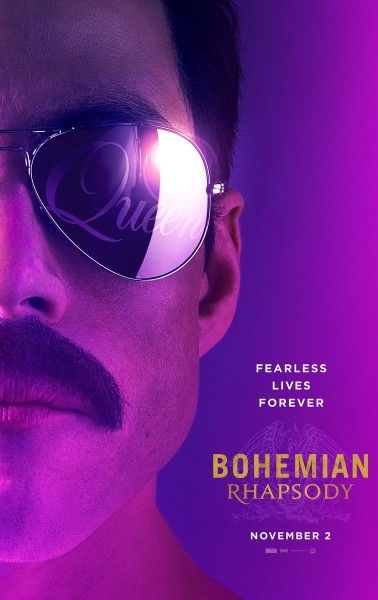Bohemian Rhapsody chronicles the story of Queen and lead singer Freddie Mercury’s (Rami Malek) rise to fame. Along the way, the group runs into individuals who refuse to believe in their rebellious choices, others who aren’t as well-intentioned as they may seem, and personal complexities that make their journey to Live Aid especially tumultuous and trying.
I deliberately steered clear of the phrase “based on a true story” because at this point, I’m well aware of the creative liberties taken with Queen’s path to becoming one of the greatest bands and entertainers of all time. But, it’s also well worth pointing out that prior to stepping into my screening of Bohemian Rhapsody, my Queen knowledge was limited to their greatest hits and minimal bullet points of their true story. How much massaging is too much for a movie that could become part of carrying on an icon’s legacy? Perhaps that’s a worthy discussion for another time, but as far as my first viewing of Bohemian Rhapsody goes, I was completely taken by the narrative constructed for the film.
One consistent thing you’ll likely hear about Bohemian Rhapsody, perhaps even straight through awards season, is that Rami Malek is phenomenal as Freddie Mercury. From Short Term 12 to Mr. Robot, Bohemian Rhapsody and other projects in between, I’m convinced of Malek’s seemingly limitless range and ability to completely lose himself in a role. Bohemian Rhapsody may not be the smoothest ride ever, but Malek’s performance successfully brings together a wide variety of snapshots of Freddie Mercury’s life, beginning with the formation of the band.
Much of the first act of the film feels like a very traditional “putting a band together” scenario, but it works. Soon after meeting Freddie and then seeing him connect the dots to Roger Taylor (Ben Hardy), Brian May (Gwilym Lee) and John Deacon (Joseph Mazzello), you’re swept up in the music and group dynamic, rooting for them to find success. And the momentum doesn’t stop once they have it. Between the frequency of powerhouse performances and the excitement of watching them change the industry, you continue to root for more, more, more until you can start to see signs of this train derailing and when it does, it hurts on multiple levels - for Freddie, the group and for all the adoring fans they had accumulated over the years.
Admittedly, I’ve spoken to friends and colleagues who take issue with the depiction of Roger, Brian and John as flawless heroes during Freddie’s downfall and also the way his sexual orientation is used almost as a catalyst for the band’s problems. While I do understand that criticism and perhaps might feel it more on subsequent viewings, during my first screening of Bohemian Rhapsody, I found this portion of the story quite effective as it’s heightened from Freddie’s perspective. He goes from one extreme to another; from a life of warmth, friendship and love to essentially being surrounded by hollow praise and adoration, something I found to be an especially devastating form of loneliness and confusion in the film. Everyone around you is seemingly firmly standing on two feet, and you’re slipping away, not necessarily for the wrong reasons. And what complicates Freddie’s situation in the movie even more is that so many things that contribute to him losing his way are out of his control.
One of the most enthralling components of the film overall is Freddie’s relationship with Mary Austin (Lucy Boynton). It’s true love that couldn’t be - or could it? The chemistry between Malek and Boynton radiates off the screen until it can’t anymore, or at least not in that same exact way. They’re so close to being able to get a traditional happily ever after, but neither can deny the truth, and the complexity of Mary’s heartbreak paired with her undying love and support for Freddie is extremely touching.
Unfortunately, the same can’t be said for Freddie’s relationship with his manager Paul Prenter (Allen Leech) though. Whereas you can feel both the heartbreak and necessity of the end of Freddie’s relationship with Mary, the draw to Paul just isn’t there. At this point I can Google factual answers to my questions, but during the film I was left wondering, who is this guy beyond being Freddie’s manager? Why would Freddie be so inclined to trust him? The band was a family. That’s something that becomes palpable and impossible for Paul to rival. And this is one point where you can see Malek’s phenomenal work saving the day; he’s able to support a lopsided portion of the story to the point at which it works well enough.
The part of Bohemian Rhapsody that had me on the verge of tears for much of the third act, is the band’s widespread impact. One might suggest that if things don’t work out for an “of the moment” band, it’s no big deal! People will forget and move on to a new sound soon enough. But that’s not the case with musicians who have a transcendent effect on their crowds, just like Queen did, and Bohemian Rhapsody marked my very first time fully understanding and feeling that, and it was emotionally overwhelming. It’s a movie that brings you to the highest high from the perspective of an adoring fan, rips it all away but then sends all the warmth and fervor flooding right back in during the recreation of Queen’s Live Aid set.
The energy radiating from the crowd is infectious and, in the context of this story, seeing the band back together on that stage is just undeniably satisfying. I was on the brink of tears the entire performance until one particular frame broke me. It isn’t a hero shot of Malek as Mercury, but rather a crowd shot with one older man putting his arm around a younger one; I suspected they could have been a father and son. There was something about that particular shot that I needed, perhaps now more than ever. There are a lot of personal and global complications in our day to day lives, but music has the power to change that. No matter your age, race, sexual orientation, you name it, when you’re singing along with more than 70,000 people, you’re all on the same level sharing the same passion, and getting to celebrate music and life that way for a moment really felt special.
Grade: A






